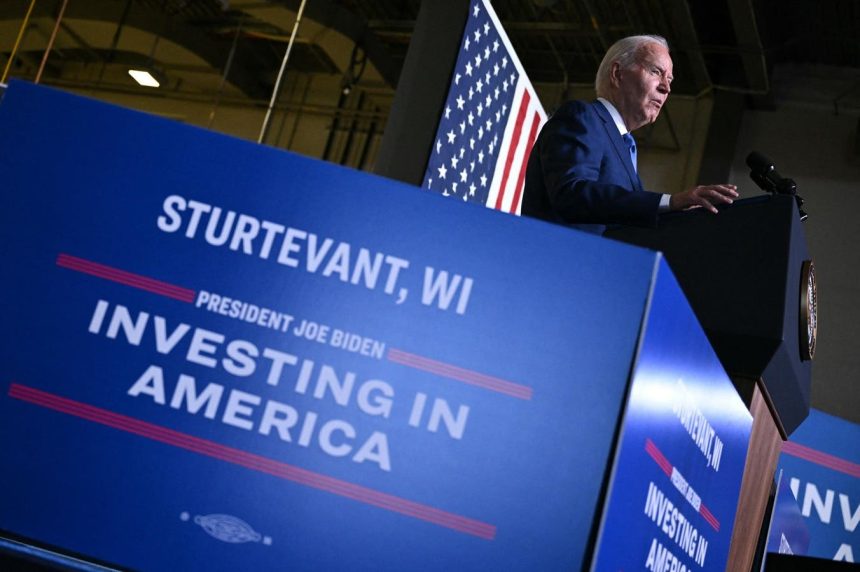The May jobs and unemployment report is out today, and it shows a continuing strong economy. The Biden Administration’s robust and durable track record on jobs and unemployment is breaking records, putting up some of the best results we’ve seen in half a century.
First, the numbers. The federal Bureau of Labor Statistics (BLS) reports that May saw an additional 272,000 jobs created, above most forecasters’ expectations. Unemployment ticked up from 3.9% to 4%, although such slight single-month changes are statistically meaningless (if the rate rises for several months in a row, then you have a trend.)
These are very strong numbers, especially this far into an economic recovery. The White House took a justified victory lap, with President Biden noting “unemployment has been at or below 4% for 30 months—the longest stretch in 50 years.”
Jobs increased in several sectors—health care, leisure and hospitality, and professional services. And wages continued rising, with average hourly earnings moving upward. BLS notes that “over the past 12 months, average hourly earnings have increased by 4.1%.”
Should we worry that higher wages are causing inflation? No. Although wage gains are positive, their rate of increase is slowing. And our inflation is driven by structural factors in supply chains, housing, and aggressive pricing by companies. Even Federal Reserve Chairman Jerome Powell has moderated his views, saying in March that wages are not the main reason for persistent inflation.
For those who care about inequality and fairness, wage trends of the last several years have been strong for lower-wage workers. The Economic Policy Institute (EPI) has documented that “real wages” (adjusted for inflation) “of low-wage workers grew 12.1% between 2019 and 2023.” If Republicans in Congress would support increasing the federal minimum wage, which has been stuck at $7.25 per hour since 2009, we’d see even stronger gains for low-wage workers
These gains for low-wage workers come from the continuing tight labor market and economic growth, but also state increases in the minimum wage. 30 states now have minimum wages higher than the federal level. The 20 laggards are mostly traditional red states like Texas, Oklahoma, Mississippi, and South Carolina, although some “purple” states like Wisconsin and Pennsylvania haven’t raised their minimums due to Republican control of at least one state legislative house.
Are there worries in the jobs report? A few, but not major ones. One important indicator to watch is Black unemployment, which ticked up to 6%. Because of historic and ongoing discrimination, Black employment lags behind that for whites, and it can be an early signal of a weakening economy.
The Black unemployment rate is traditionally volatile, and labor economists like EPI’s Elyse Gould note the importance of staying at full employment for “historically disadvantaged groups…who always experience a tougher labor market.” (Gould is one of the best analysts we have of employment and the monthly BLS report; see her blog here.)
Tight labor markets during Biden’s presidency have helped. In April, we saw the lowest gap between Black and white unemployment ever recorded, and the Biden Administration has been proactive in addressing persistent racial gaps in employment and society.
But as economist Darrick Hamilton always reminds us, it will take more than just overall tight markets to fully address labor market discrimination. Ultimately, we need formal economic rights and policies like a federal job guarantee to help close these structural gaps.
Biden’s economic track record is particularly strong when you consider that many economists were expecting a recession by now. Former Treasury Secretary Larry Summers spoke for many economists in 2022, saying a recession was “almost inevitable,” while in 2023 Summers predicted a “meaningful and significant slowdown” for the economy, again like many other forecasters.
Can it last? It wouldn’t be surprising to see some slowdown in jobs and wage growth in the coming months, given the historic gains we’ve seen so far. But there’s nothing inevitable about recessions. Economists like James K. Galbraith of the University of Texas argue that both growth and recession are driven in substantial part by policy choices, and intelligent policy can help avoid downturns.
Biden’s policies have focused not only on sustaining overall growth, but on finding ways to get growth’s benefits to lower-wage workers and economically troubled regions of the country. Based on today’s jobs and employment numbers, so far, so good.
Read the full article here
















